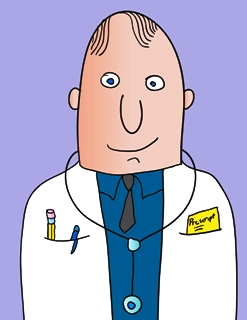CSMS Magazine Staff Writer
After a long absence, Gina Jean Pierre is back in full force with some great delights for our CSMS Magazine readers. On the menu this morning is a note of concern. Be careful when going to the doctor.
We trust our doctors to make our health the highest priority—to “do the right thing” when ordering tests, prescribing drugs, etc. In taking the Hippocratic Oath, they swore to do just that.
Like the rest of us, however, doctors must earn a living. And sometimes the treatment a doctor prescribes—or withholds—has a direct bearing on his/her own financial well-being.
DOCTORS, HOSPITALS AND LABS
Some doctors have financial stake in a diagnostic lab, hospital or another local health-care facility. Others don’t have a direct stake—but have a close relative that does.
With such an arrangement, each referral the doctor makes is, effectively, a self-referral. Each time he orders a $1,000 MRI exam or puts you in the hospital, he turns a profit—or turns a profit for someone to whom he is closely tied.
Such an arrangement tempts doctors to order needless tests, recommend needless operations and hospitalizations, etc.
Or doctors may be tempted to send you to a hospital that handles their bills or provides them with other perks—even when another hospital is better equipped to treat your specific ailment. Doctors who have a financial stake in a health-care facility make referrals to it more than doctors who lack such an interest, studies have shown.
Self-defense: Ask your doctor, “What financial ties or other arrangements do you have with the lab (or hospital) you’re sending me to? The fewer ties, the better.
In areas with few doctors, it may be simply because he owns a share of a local diagnostic lab. You may not have a choice, Or—your illness may require immediate attention, leaving you little time to consider other options.
But if you have a choice, a doctor’s financial ties are a factor to consider—along with his training, reputation, etc.
NEEDLESS PROCEDURES
Doctors who work under the traditional “fee-for-service” system get paid for each service they render to patients. With such a setup, it’s always in a doctor’s financial interest to do more procedures—not fewer. Most doctors manage to resist the obvious temptation to perform needless surgery, order superfluous diagnostic tests, etc. But the profit motive can—and sometimes does—cloud clinical judgment.
Self-defense: If your doctor recommends endoscopy, hysterectomy, catheterization or another invasive diagnostic test or elective (non-emergency) surgery, get a second opinion. Find a physician with no ties to your doctor—ideally someone who practices at another hospital.
DRUG COMPANY GIFTS
For almost any illness, a range of treatment options is available. But drug makers spend millions of dollars on marketing campaigns designed to convince doctors that drug therapy is the best route.
And—each drug maker spends millions on advertisements that are designed to convince doctors to use its drug. These efforts don’t end at advertising.
Kickbacks are illegal. But drug makers find other ways to ensure that doctors think of their products when they reach for a prescription pad.
Usual approach: Showering doctors with inexpensive gifts such as pens embossed with the name of the drug being promoted…or coffee and Danish in the doctors’ lounge.
In the past, drug companies have also been known to offer doctors…
- All-expensive-paid weekends at resorts hosting “educational seminars” on new drugs.
- Super bowl tickets.
- Cash payments for participating in “market research”
Bottom line: The drug your doctor prescribes may be the one he’s been persuading to prescribe. That might not be the cheapest drug or the most effective one for your condition.
So, BE WISE!



Think you very much for this nice info. I have always thought of this. Great online magazine, by the way.